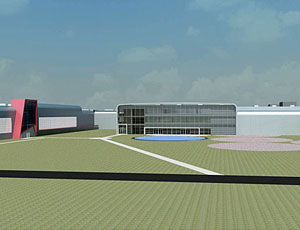The Dept. of Energy has awarded Paris-based Areva Corp. a $2-billion conditional loan guarantee for a greenfield uranium-enrichment plant in Idaho Falls, Idaho—one of the plants needed to help supply the U.S. market with enriched uranium for nuclear powerplants.

The DOE says it has an additional $2 billion for a loan guarantee to support another uranium-enrichment plant, a guarantee for which Bethesda, Md.-based USEC Inc. has said it will re-apply later this year.
Areva expects to award an engineering, procurement and construction contract for the 400-acre, $3.3-billion facility within the next few months, says Areva spokesman Jarret Adams.
Areva would need to meet the conditions of the guarantee and receive a license from the Nuclear Regulatory Commission before it can begin construction. If the license is granted this year, Areva could start in 2011, Adams says. The plant would be built in modular units, with the first section of the plant coming online as early as 2014 and build-out continuing through 2017 or 2018.
“Increasing uranium enrichment in the United States is critical to the nation’s energy and national security,” Dept. of Energy Secretary Steven Chu said in a news release announcing the guarantee on May 20. “Existing reactors will need additional sources of enriched uranium soon. New nuclear plants that could start to come online as early as 2016 will also need a steady, reliable source of uranium-enrichment services. Areva’s project will help to meet that demand.”
USEC’s Paducah, Ky., plant is the only source of enriched uranium in the U.S., supplying about 50% of the nation’s enriched uranium. That plant uses 50-year-old gaseous-diffusion technology, however, and requires 95% more electricity than the newer centrifuge technology. The rest of the enriched uranium is imported, with Areva supplying 20% to 25% of the supply from its enrichment facilities overseas.
USEC has planned to build a more efficient, $3.5-billion centrifuge facility in Piketon, Ohio. That effort was stalled last July when DOE rejected its loan guarantee application, saying the company needed to spend another 12 to 18 months revising its application and demonstrating its new technology. While both USEC and Areva plan to use centrifuge technology, the USEC-developed centrifuge design has not been used at other sites, while Areva’s technology is used at European facilities.
USEC said on May 4 it is updating its loan guarantee application and will resubmit it to DOE this summer.
After DOE rejected its application, USEC halted pre-construction engineering and site infrastructure work in Piketon because it said it needed additional financial support. At the time, USEC said plant design work was approximately 80% complete. Irving, Texas-based Fluor Corp. has a $1-billion engineering, procurement and construction contract for the 1.7 million-sq-ft facility.
The Babcock and Wilcox Co., Barberton, Ohio, has a $500-million contract with USEC to manufacture most of the centrifuge. Honeywell Technology Solutions Inc., Columbia, Md., has a $78-million contract to perform final installation of the centrifuges. Under a $45 million cost-sharing agreement with DOE, the manufacturing of some test centrifuge machines is continuing.
Construction continues on U.K.-based Urenco Ltd.’s enrichment plant in Eunice, N.M. The company, formerly Louisiana Energy Services, is building a $3-billion enrichment plant at a greenfield site in Eunice, N.M. San Francisco-based URS Corp. is providing construction and construction management for the structure.

Post a comment to this article
Report Abusive Comment